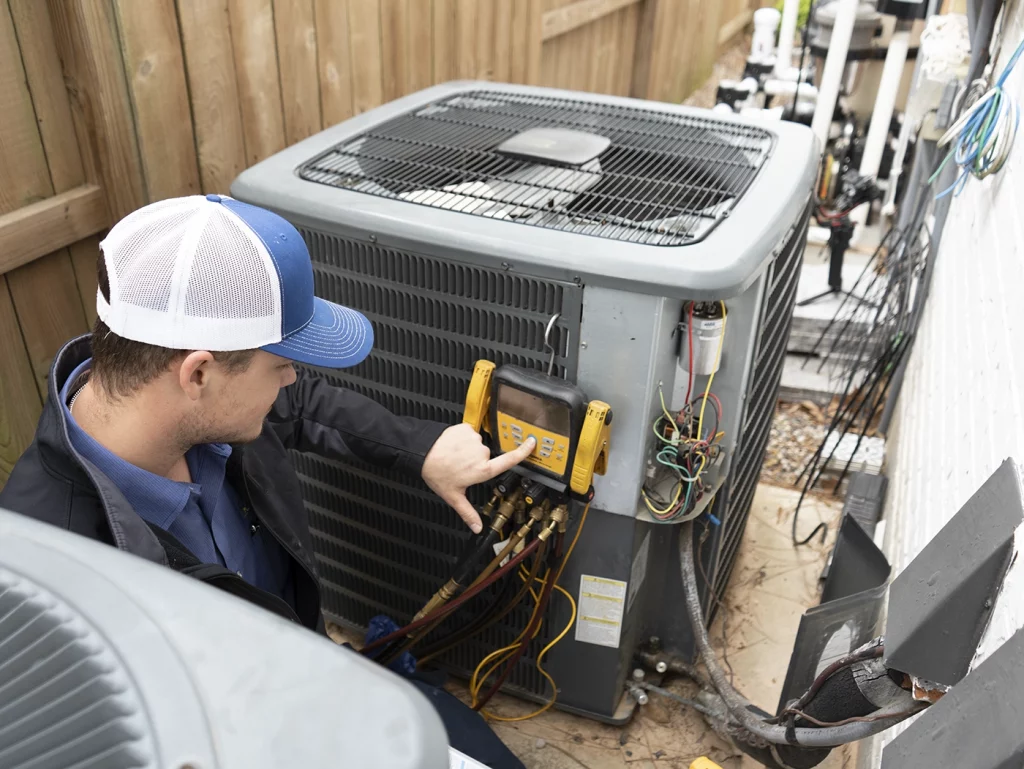Compared to most Texas communities, Magnolia is a relatively newly developed area in which to live. “Mink,” Texas became “Magnolia” in 1885, but the majority of our homes were built between 1990-2009. This means many “new” homes’ air conditioning systems in Magnolia are aging.
The average lifespan of an HVAC (heating, ventilation, air conditioning) system is 10-15 years and some can last twenty years. You just can’t get much more out of them after that. AC components also have lifespans. An AC capacitor will last longer than other parts of your HVAC system, but even newer models can have problematic AC capacitors.
How To Know if Your AC Capacitor Is Broken
9 Signs Your AC Capacitor Is Broken
Your AC capacitor stores electricity and sends out powerful energy bursts. It literally jolts your air conditioner’s motor into working. Once your AC starts up, it reduces its voltage output but continues to provide a steady power supply. This may sound like a battery-powered operation, but it isn’t.
AC capacitors are not batteries; you can’t pop one out
and replace it with a new one. –Natalie Arevalo Chumley
If you have a broken AC capacitor, your system may continue to run. You might not immediately know you have a problem. Signs your AC capacitor is broken or needs AC repair in Magnolia and Montgomery County include:
- Blows warm air
- Burning smell
- Energy bills spike for no reason
- Humming noise
- Random cycling (turns off and on for no reason)
- Takes too long to cool
- Turns off for no reason
- Visible smoke (Turn your system off and call 281-356-8564)
- Won’t turn on
…However, some of those symptoms can also be signs of other HVAC issues. The problem could be the compressor rather than the capacitor. This is why your AC professional needs to inspect the unit.
Your AC technician will use specialized equipment and look for things you can’t see, like:
- Cracks
- Expansions/bulges
- Leaks/oozing liquids
- Low voltage
If you have a multimeter and/or microammeter and know how to use it, tell your AC repair company the readings when you schedule a service call. But before you run to the nearby box store to buy a multimeter, reconsider DIY (do-it-yourself) capacitor testing. YouTube videos may make it look easy, but it’s very dangerous.
Capacitor testing can only occur once the power has been shut off, wiring has been disengaged, and voltage remaining in the capacitor has been drained. –hvac.com

Why Your AC Capacitor Needs Repair
Savvy homeowners know things happen for a reason. But AC capacitor problems aren’t your fault. Some of the reasons why your capacitor needs repair may include:
- Above-average usage (wear-and-tear)
- Age
- Circuit overload/overheating
- Cooling system short circuits
- Debris blowing into and damaging the system
- Extreme heatwaves
- Lightning strikes
- Power surges
Can You Replace Your AC Capacitor?
AC capacitors don’t cost that much. They’re pricier today than ever before because of material shortages and supply chain snafus, but as HVAC components go, they’re relatively inexpensive to buy. A lot depends on where you live in the world.
So, can you DIY repair or replace your AC capacitor? It’s a bad idea on so many levels that the short answer is no. Don’t DIY an AC capacitor repair or replacement. Here’s why:
If fire or other property damage occurs, your insurance can deny coverage.
It seldom happens, but they have the right to say you needed (at the very least) a professional opinion before and licensed inspection after any electrical DIY project.
You risk voiding the manufacturer’s warranty.
AC capacitors may not be expensive but making mistakes costs more in do-overs and time than if you’d had professional AC service. Also, AC capacitor repair or replacement is about the most dangerous electrical HVAC project to undertake.
Your capacitor system uses either start and run capacitors or a dual-run capacitor.
A start-capacitor AC uses a volt-jolt to jump start your air conditioning. The run capacitor provides a steady flow of power to help your AC airflow maintain its consistent speed. The dual-run capacitor is the combination of start- and run-capacitors and common in central air systems.
If your start or run capacitor is broken, you should consider replacing both with a dual run. It will do two jobs for the price of one, save space inside your unit, and is an easier-running component.
Your risk of injury or death skyrockets with a DIY capacitor replacement project.
An AC capacitor is high-voltage equipment, even with the power turned off at the unit and at the circuitry box. You’ll want a certified AC professional to check it afterwards anyway.
Repair Your Air Conditioner Capacitor in Magnolia, TX
Country Air of Magnolia will always work with you to find an affordable solution to heating and air conditioning problems. Our HVAC technicians are trained in industry-best technology and experienced with every make and model AC and heating system. In addition to parts’ warranties, we guarantee our work.
For the best local home HVAC service, call 281-356-8564 or contact Country Air.






